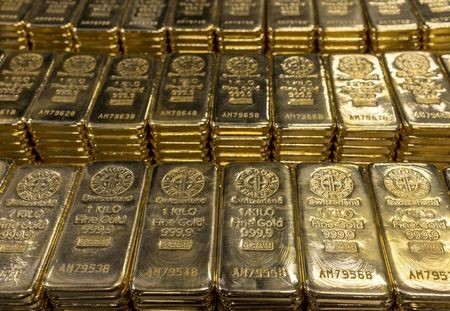




Policy Rate Updates: Closer to BSP’s Goldilocks moment
 DOWNLOAD
DOWNLOAD

Inflation Update: Speeds up but remains below target
 DOWNLOAD
DOWNLOAD

Monthly Economic Update: Fed back on track
 DOWNLOAD
DOWNLOAD


Gold dips 1% as robust US jobs data eases recession concerns

Aug 5 (Reuters) – Gold prices extended losses to slide more than 1% on Friday as an unexpectedly strong US jobs report eased recession worries and dashed speculation that the Federal Reserve would pivot away from its aggressive monetary policy tightening.
Spot gold fell 0.9% to USD 1,775.09 per ounce by 1:43 p.m. ET (1743 GMT), after falling as much as 1.5% earlier in the day. US gold futures settled down 0.9% at USD 1,791.2.
“Gold had recently rallied on the thought that the Fed will shift from hawkish to dovish. But the jobs data shows the US economy is strong, and this can prompt the Fed to be more aggressive, which is not a good story for gold,” said Bart Melek, head of commodity strategy at TD Securities.
An environment marked by high interest rates hurts bullion as it yields no interest.
US employers hired far more workers than expected in July, with the unemployment rate falling to a pre-pandemic low of 3.5%.
The positive employment picture gives the Fed further scope to raise interest rates without the risk of tipping the economy into recession, and gold’s upside gains are likely to be capped at USD 1,800, Rupert Rowling, market analyst at Kinesis Money, said in a note.
The dollar index was up 0.8%, making gold more expensive for overseas buyers, while US Treasury yields extended their rise after the data.
On the physical side, gold premiums in China rose this week on safe-haven demand driven by rising tensions with the United States over Taiwan.
“If there is a pop-up in geopolitical issues, then this will help gold, but it won’t be a sustained rally … The next catalyst for gold prices will be (the) US CPI print coming out next week,” Melek added, referring to consumer prices data.
Spot silver fell 1.4% to USD 19.87 per ounce, en route to falling for the week.
Platinum rose 0.2% to USD 927.98, on track for its biggest weekly gain since early June.
Palladium rose nearly 3% to USD 2,125.95.
(Reporting by Ashitha Shivaprasad in Bengaluru; Editing by David Holmes and Paul Simao)
This article originally appeared on reuters.com





 By Reuters
By Reuters